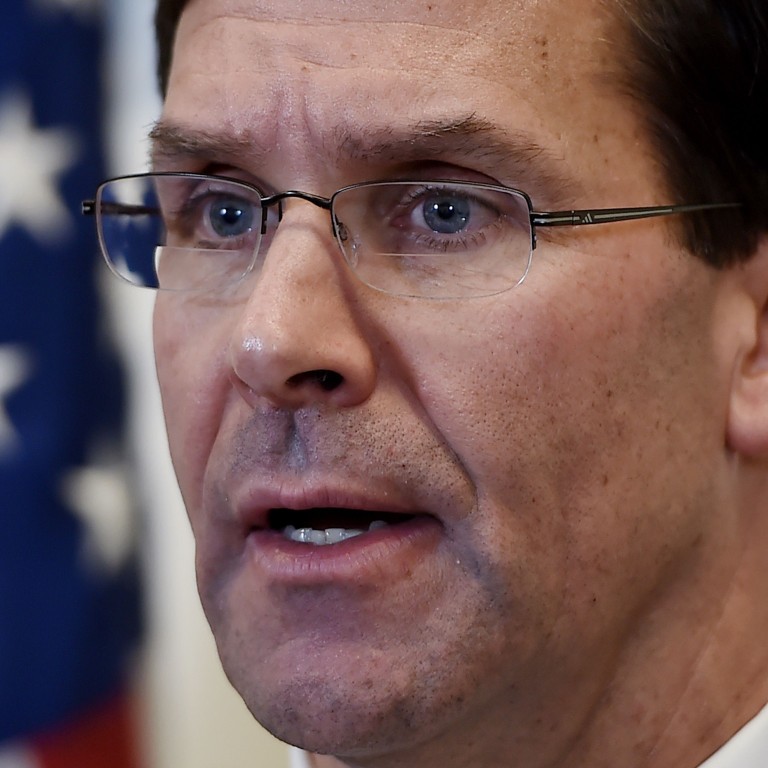
US Defence Secretary Mark Esper starts second Indo-Pacific tour with bid to counter Chinese power
- Pentagon says Esper will discuss Beijing’s South China Sea claims on visit to South Korea, Thailand, Philippines and Vietnam
- Statement giving details of trip calls Indo-Pacific region the Pentagon’s ‘priority theatre’
It is his second trip to the region after taking charge at the Pentagon in August.
The tour started with a visit to South Korea on Thursday, and will include stops in two other treaty ally nations – Thailand and the Philippines – as well as Vietnam, which is growing increasingly close to the US.
The Pentagon said Esper would listen to those nations’ concerns and reaffirm the US commitment to partnerships because “nowhere is that more important than in the Indo-Pacific region”, the statement said, calling the area the US military’s “priority theatre”.
The visit follows last week’s East Asian Summit in Bangkok, where US President Donald Trump disappointed some regional allies by sending as his representatives to the event the lowest-ranking American officials – national security adviser Robert O’Brien and Commerce Secretary Wilbur Ross – since America formally joined the parley in 2011.
Yuanzhe, professor at China Foreign Affairs University, said Esper’s visit reflected an anxiety in Washington that little progress had been made in implementing the US Indo-Pacific strategy.
“The Trump administration has delivered inconsistent and self-contradictory messages in terms of Southeast Asia policy – they say these nations are important in the Indo-Pacific strategy while not actually devoting enough resources, or even attention to them,” he said.
“So the defence secretary is trying to push for the allies to pressure China more.”
The Pentagon statement on the visit also named China as a “greater threat” than Russia, and added Esper would discuss Chinese claims in the disputed South and East China seas.
Unopposed no more: Beijing’s ambitions in the South China Sea increasingly draw US attention
It specifically mentioned “new relations” with Vietnam by highlighting arms sales, joint military exercises and a port visit from the aircraft carrier USS Carl Vinson last year.
Vietnam and the Philippines are among the rival claimants in the South China Sea, an area through which 40 per cent of the world’s trade passes. Malaysia, Brunei and Taiwan also have overlapping claims in the region.
Tensions in the region appear to have cooled as China and the Association of Southeast Asian Nations try to agree on a code of conduct for the South China Sea – although a Chinese survey ship was involved in a lengthy stand-off with Vietnamese coastguard vessels in disputed waters in recent months.
The US has also been challenging China’s claims by sending ships and warplanes on patrol near its military outputs in the area, but Ren said these operations were “risky for the US, so Esper will try to mobilise other claimants too”.
In August the US formally withdrew from the 1987 Intermediate-Range Nuclear Force treaty and Esper said at the time that the US hoped to deploy previously banned missiles in the region.
Beijing’s South China Sea ambitions increasingly draw US attention
He has already asked Japan and Australia – two other long-standing US allies – to host the missiles on their soil, and Ren said Esper would probably raise the issue with Thailand and the Philippines.
However, they are likely to take a cautious approach and Asean has previously indicated that its members would prefer not to take sides in a confrontation between the US and China.

